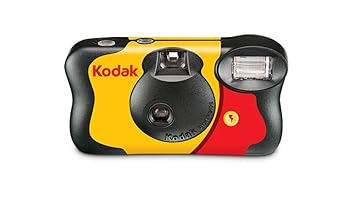Kodak funsaver 35mm single use camera
Kodak funsaver 35mm single use camera review

Kodak FunSaver Review
The Kodak FunSaver, B&H, Amazon, eBay, maybe a ‘single-use,’
‘throw-away’ or ‘disposable’ camera, whichever term you favor. Like
nearly all single-use cameras, it's a really simple plastic lens, manual
mechanism, and 27 exposures. This model comes with a flash and replaced
the Kodak HD Power Flash model a couple of years ago, so I’m updating
Kodak’s primary single-use camera.
The film is already loaded, all you are doing is advance the film via
thumbwheel until it won’t turn anymore, then simply look around the
viewfinder and take a snap. If you would like to use the flash, just
push the button on the front of the camera until the red dot on the
highest turns red, which suggests the flash is prepared.
These little cameras are popular at weddings where the guests are
encouraged to select them up and begin shooting, especially after the
liquor starts to flow, then turn them into the hosts before going home,
therefore, the newlywed couple can get them developed and have some
laughs afterward.
Film type and exposures: I feel Kodak uses 24 exposure 800 ‘max’ type,
which is not any longer available as a stand-alone film, however, when
loading during a darkroom as they are doing when making the camera
yields 27 images. you'll get 27 images on any roll of 24 as long as
you'll load the camera yourself within the dark and don't need to
advance it to the primary shot mark; however, with motorized
auto-loading cameras, you almost certainly won’t get any longer than 25.
Shutter speed: my test device measured the shutter speed at about 1/90s.
Aperture: I’m guessing the aperture is near F/9.5-10 because it is on other similar cameras.
Lens and focal length: approximately 31mm, plastic single meniscus type
projecting a picture onto curved film—via a curved film gate. Color and
contrast are quite good considering how tiny and cheap the lens is.
Flash: 4′ to 11.5′ (1.2m to 3.5m). You press the flash button on the
front until the red light on top of the camera comes on, then take your
shot.
The camera made in China, a film in the USA.
Batteries: one Chinese SafeEnergy Alkaline AA battery installed. This
battery will last tons longer than the camera, albeit you employ the
flash on all 27 pictures. I take these out before putting the camera
within the recycle bin because they still have tons of use left in them;
this one still had 1.6 volts on the test meter (fully charged)after a
few dozen flashes.
Viewfinder: bright and straightforward to ascertain through.
Cost; between $10 and $12 for singles, and fewer if you purchase them in multi-packs.
Enough of the intro, let’s inspect some product shots of the Kodak FunSaver Single Use Camera.
Normally you won’t see the film if you only turn within the camera to
your developer; however, if you're taking the film out of the camera
yourself this is often what you’ll see. the highest cap may be a bit
different therein it's these odd teeth rather than the circle and slot
on normal cartridges. Take the film out of the camera by prying rock
bottom right side cover off and removing the cartridge.
Conclusion.
The Kodak FunSaver takes some decent photos if you enjoy watching 4×6″
prints, or simply want something different for a change. My Mom went
back to using disposable cameras this year as she got uninterested in
joking with a camera that was always dead when she wanted to use it, or
it didn’t focus right or recorded video when she just wanted a still
image.
The FunSaver has no such problems. The battery will stay charged for
years; and albeit it goes bad, you'll still use the camera outdoors in a
good light. I used a disposable camera for a few years and kept it in
my car where it’s 150° (65°C) degrees inside during the summer. once I
got the photographs back from the shop, they clothed just fine.
Comments
Post a Comment